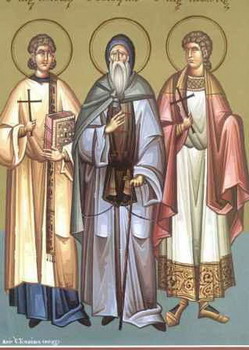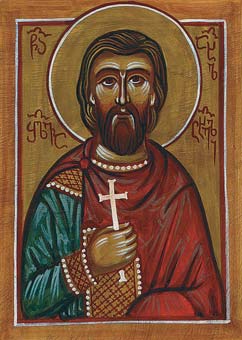|
|
The Holy Martyrs Manuel, Sabel and Ishmael These three brothers were Persians, of a pagan father and a Christian mother. Brought up in a Christian spirit and baptised, they were high officials at the court of King Balanos, and were sent to the Emperor Julian the Apostate to conduct negotiations and confirm the peace between the Persian and Graeco-Roman Empires. The apostate Emperor had arranged some sort of vile celebration in honour of the idols at Chalcedon, and he went there with his nobles bearing sacrifices for the idols. The Persian delegates absented themselves from the celebration. The Emperor summoned them and ordered them to take part in the festivities and offer sacrifice to the gods. They then declared that they were foreign envoys who had come from the King of Persia to establish peace between the two Empires, and not for any other reason. They said that they were Christians and considered it unworthy to bow down before lifeless idols and offer them sacrifice. The Emperor. in fury, had them thrown into prison. They were brought out the next day, and he began to dispute with them about the Faith, but the holy brothers were irrefutable and unwavering. They were then bound naked to trees and struck and flayed with iron flails. During their torture, they prayed to God, thanking Him for it: 'O sweet Jesus, these pains are sent to us for love of Thee.' An angel of God appeared to them, comforted them and took away all their pain. Contrary to all understanding of the rights of foreign envoys, the wicked Emperor Julian finally issued the order that the three brothers were to be slain with the sword. There was a great earthquake at their execution, thus making it impossible for the pagans to burn them as the Emperor had commanded. The earth later gave up the martyrs' bodies for Christians to find and bury. Many miracles were worked over their relics, bringing many pagan witnesses to the Christian faith. When the Persian king heard of the inhuman death that Julian had provided for the envoys, he prepared for war against him. Julian set out for Persia convinced of victory, but he was beaten to his knees and perished miserably. These three brothers were Persians, of a pagan father and a Christian mother. Brought up in a Christian spirit and baptised, they were high officials at the court of King Balanos, and were sent to the Emperor Julian the Apostate to conduct negotiations and confirm the peace between the Persian and Graeco-Roman Empires. The apostate Emperor had arranged some sort of vile celebration in honour of the idols at Chalcedon, and he went there with his nobles bearing sacrifices for the idols. The Persian delegates absented themselves from the celebration. The Emperor summoned them and ordered them to take part in the festivities and offer sacrifice to the gods. They then declared that they were foreign envoys who had come from the King of Persia to establish peace between the two Empires, and not for any other reason. They said that they were Christians and considered it unworthy to bow down before lifeless idols and offer them sacrifice. The Emperor. in fury, had them thrown into prison. They were brought out the next day, and he began to dispute with them about the Faith, but the holy brothers were irrefutable and unwavering. They were then bound naked to trees and struck and flayed with iron flails. During their torture, they prayed to God, thanking Him for it: 'O sweet Jesus, these pains are sent to us for love of Thee.' An angel of God appeared to them, comforted them and took away all their pain. Contrary to all understanding of the rights of foreign envoys, the wicked Emperor Julian finally issued the order that the three brothers were to be slain with the sword. There was a great earthquake at their execution, thus making it impossible for the pagans to burn them as the Emperor had commanded. The earth later gave up the martyrs' bodies for Christians to find and bury. Many miracles were worked over their relics, bringing many pagan witnesses to the Christian faith. When the Persian king heard of the inhuman death that Julian had provided for the envoys, he prepared for war against him. Julian set out for Persia convinced of victory, but he was beaten to his knees and perished miserably.Our Holy Father PiorA Nitrian solitary, he was inflamed with love for God. Pior renounced the world early and went off into the Egyptian desert, where he gave himself to a life of heroic asceticism. It is said that he never sat at table to eat, but always ate standing up and working. When he was asked why he did this, St Pior replied: "I do not wish to be concerned with eating as though it were an occupation. It is merely coincidental." When he was called to sit in judgement on a brother who had done something wrong, he arrived carrying a bag of sand on his back and a small pouch in his hand. Questioned as to their significance, the holy man answered: "The bag of sand on my back is my sins, which I do not see; the pouch of sand is the sin of my brother whom I have to judge." Then all the brethren were confounded and exclaimed: "This is the way of salvation!" He lived for a hundred years and went to his rest in the Lord in the 4th century.
St. Hypatius, abbot of monastery of Rufinianos (446)
Hieromartyr Philoneides, bishop of Kurion in Cyprus (306)The PriestMartyr Philonides, Bishop of Cureia, suffered martyrdom on Cyprus in about the year 306 in a persecution under the emperor Maximian Galerius (305-311).
Venerable Ananias the Iconographer of Novgorod (1581)The Monk Ananii of Novgorod, an iconographer of the Novgorod Antoniev monastery, asceticised during the XVI Century. An account about him is included in the narration about the miracles of the Monk Antonii the Roman, from which it is known, that the iconographer Ananii wrote "marvelous icons of many holy wonderworkers" and, fulfilling a monastic vow, not once in 33 years did he go outside the monastery walls. Historical records impute the time of his blessed end as the year 1581.
Martyr Isaurus, and with him Basil, Innocent, Felix, Hermes, and Peregrinus of AthensMartyr Shalva of Akhaltsikhe (1227) The Holy Martyr Shalva was distinguished by his many Christian virtues. For his bravery and valour, the holy nobleborn Empress Tamara the Great (Comm. 1 May) appointed him governor of the Akhaltsikh district (in southern Gruzia-Georgia)... The Holy Martyr Shalva was distinguished by his many Christian virtues. For his bravery and valour, the holy nobleborn Empress Tamara the Great (Comm. 1 May) appointed him governor of the Akhaltsikh district (in southern Gruzia-Georgia)... |